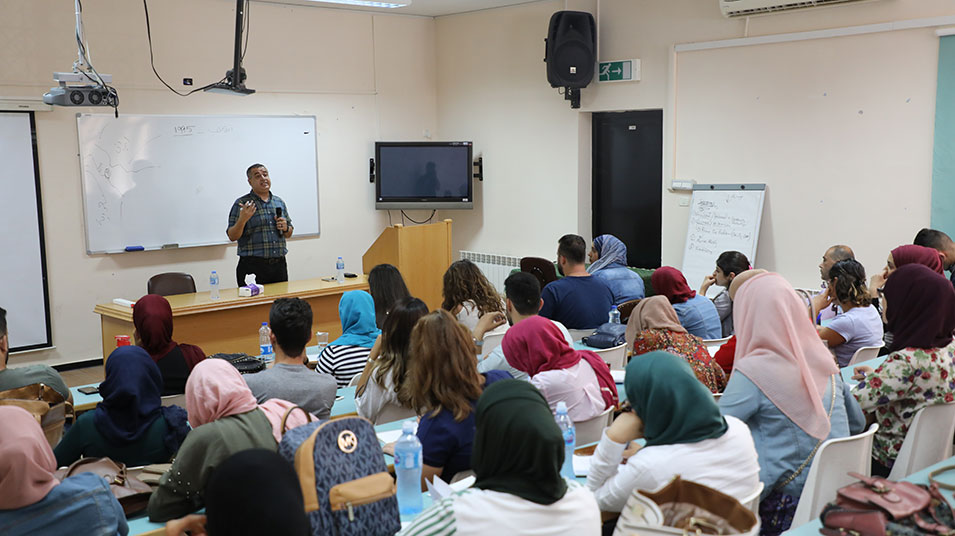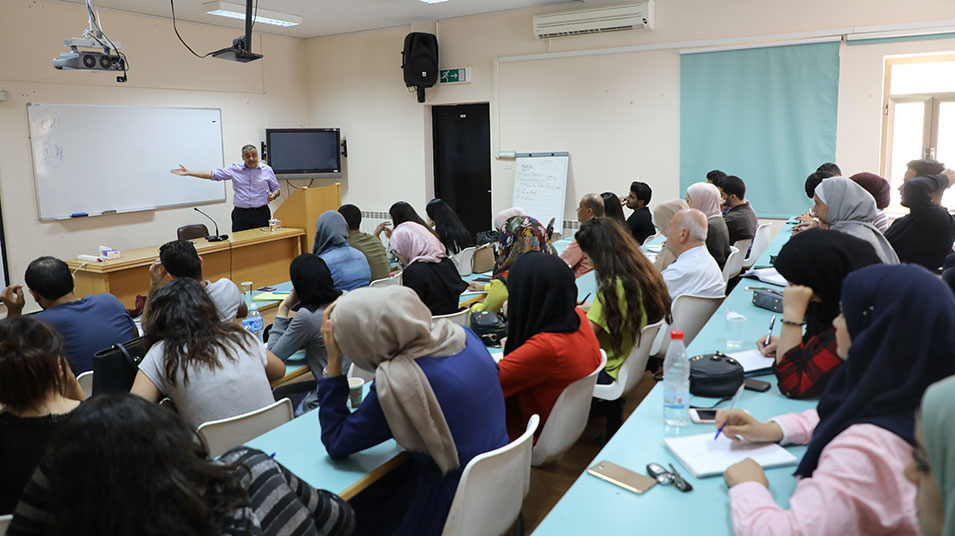Lecture Series on Arab Political Changes and Dilemmas
The Ibrahim Abu Lughod Institute of International Studies, in cooperation with Konrad- Adenauer- Stiftung, held a lecture series on key regional issues and current policy changes, featuring Ibrahim Fraihat, an international conflict resolution professor at the Doha Institute for Graduate Studies.
In the fist lecture, held on August 6, 2018, Fraihat talked about Qatar’s foreign policy and the Gulf crisis. The professor started by emphasizing on the role of geopolitics in defining Qatar’s foreign policies, especially because it resides between two key players in the region: Iran and Saudi Arabia.
Despite its small size, according to Fraihat, Qatar has had an extraordinarily active foreign policy since 1995, while before 1995, the country sought to guarantee its safety and survival by sheltering under the Saudi security umbrella. “After Sheikh Hamad seized power in a coup against his father Emir Sheikh Hamad Khalifa bin Hamad Al Thani, Qatar began to act more independently in its foreign policy,” he explained.
Fraihat continued, “This decision was not easy. Qatar needed to find means to maintain its security and survival; especially because it does not have military power. Therefore, Qatar’s foreign policy tools underwent a remarkable development with respect to the conceptualization of both soft power and smart power.”
He gave examples on the means that Qatar used after the political changes, such media, education, sports, financial aid and mediation. The country for instance is preparing to host international sports tournaments, most importantly the World Handball Championship in 2015 and the FIFA World Cup in 2022. In addition, it is known for its ability to mediate peace talks between parties in conflict.
“After the Riyadh Summit in late May 2017,” said Fraihat, “Islamic and Arabic countries, in cooperation with the U.S President Donald Trump, reshaped the region’s policies giving strong support for Saudi Arabia’s efforts in fighting against states that stand with the Qatari-supported Muslim Brotherhood and Iran. This has induced states to take a stance against Qatar, and approve cutting off diplomatic ties with Qatar.”
The second lecture, held on August 7, 2018, explored the Iran- Saudi Arabia Cold War and its effects on the politics of the Middle East. Fraihat detailed the impact of the proxy-driven conflict between Iran and Saudi Arabia on the balance of powers in the Arab world.
Fraihat said that the 1967 Arab League Summit was followed by a split of the Arab position, resulting in the emergence of two camps – the “progressive” and the “regressive” Arab countries. This categorization later gave way to the “axis of resistance” and “axis of moderation” nomenclature. “Iran, since the revolution of 1979, has pursued a policy of ‘exporting revolutions,’ that is, they want to affect regime changes in neighboring countries. This set them on a collision course with Saudi Arabia and the Arab Gulf countries. Iraq, however, was a balancing regional power through which regional stability was maintained,” Fraihat remarked.
“Presently, the distribution of regional powers is as such,” observed Fraihat: “First, there are the neutral countries, such as Saudi Arabia, the United Arab Emirates, Bahrain, and Egypt. Then, there are a couple of countries – Qatar and Turkey – which sprang as an offshoot of the first category; these countries are neutral in some aspects, but don’t fully follow the standards by which the first are judged. Third are the resistance countries, such as Syria, Iraq, and Iran. Finally, there are the non-state actors, such as ISIS and Al Qaida.”
Fraihat also reviewed the areas of contention by which the four blocs affect, and exert influence on, one another. Those areas, he said, are the revolutions and counter-revolutions – viz. the Arab Spring – the global alliance against ISIS, which drove the terrorist state back to a covert, underground organization; and the cold war between Iran and Saudi Arabia.
The regional stopgap that was Iraq, however, was extinguished after the 2003 U.S. invasion of Iraq, Fraihat said. The period of regional stability was over, and the Iranians swiftly resumed their efforts while recruiting militias and waging proxy wars, he added.
The professor concluded the lecture by pointing out that amid these dynamics, Saudi Arabia felt encircled by Iranian allies and proxies, and concentrated its efforts to remove, or at least mitigate, the Iranian threat, Fraihat argued. Iran, similarly, found itself surrounded by American military bases in Qatar, the UAE, Afghanistan, and Pakistan.
Professor Farhat is a Birzeit University graduate, and now an international conflict resolution professor at the Doha Institute for Graduate Studies and Georgetown University. He previously served as senior foreign policy fellow at the Brookings Institution, and taught international conflict resolution at George Washington University and George Mason University. His latest book is Unfinished Revolutions: Yemen, Libya, and Tunisia after the Arab Spring (Yale University Press, 2016).








